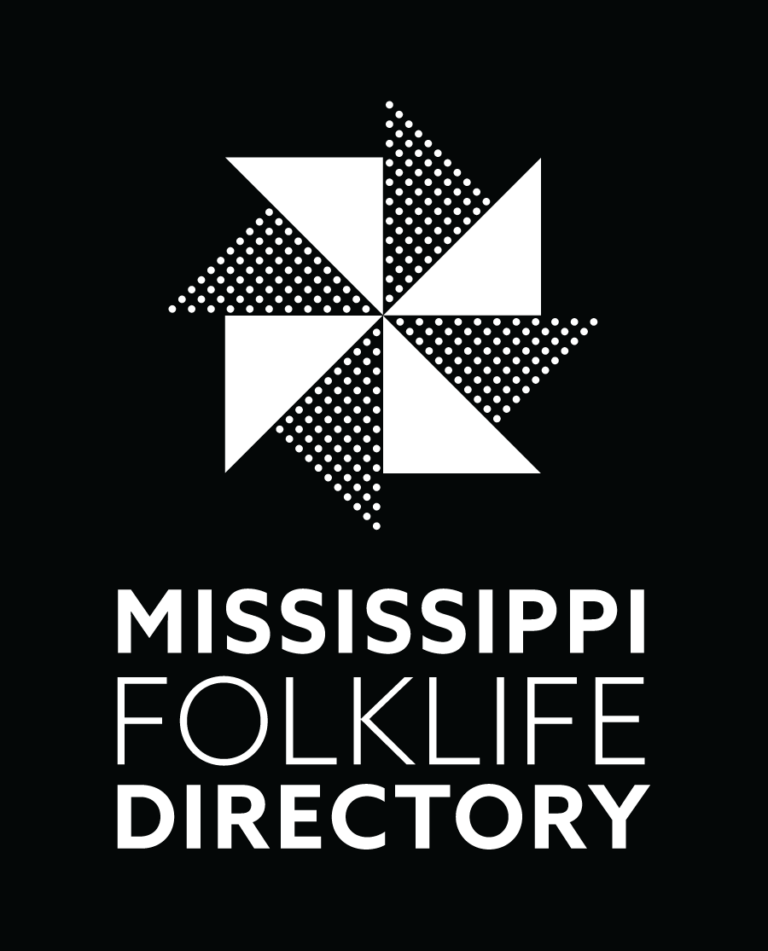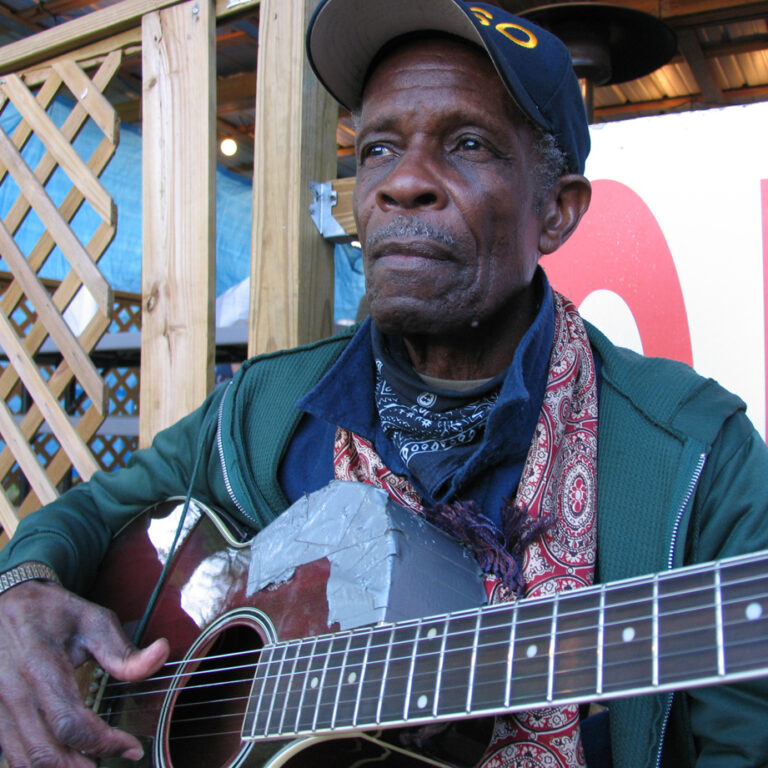Lee Chester “L.C.” Ulmer was a native of South Mississippi who for 50 years played music all over the U.S.—“like horse manure, everywhere!”—before returning home to the Ellisville area in 2001. He was a multi-instrumentalist who played guitar, keyboards, drums, fiddle, banjo mandolin, kazoo, and harmonica, and performed for many years as a “twelve-piece” one-man-band.
Ulmer was born in 1928 in Stringer, Mississippi, and later moved with his parents Luther and Mattie, six brothers, and seven sisters to a plantation near Moss Hill. His father played guitar, harmonica, and “Jew’s harp.” Most of Ulmer’s siblings played music, and his mother’s cousin (Charlie Lindsey) was a bluesman. Many musicians visited the house to play and drink whiskey, the most famous being Meridian’s Jimmie Rodgers.
The plantation owner’s son ran a whiskey still, and Ulmer’s brother James hosted picnics, attracting many workers from the nearby log camp (Camp Allen) run by the E.L. Bruce lumber company. Music was also played at “fish fries” and “breakdowns” held at various homes most Fridays, Saturdays, and Sundays.
Ulmer began playing guitar when he was nine years old and was soon playing with family and other local musicians on the family’s porch. He played by himself for tips, and often played together with white musicians, and remembers old square dance numbers he used to perform. He recalls with delight listening at home to 78rpm recordings by artists including Blind Lemon Jefferson, Blind Boy Fuller, Tampa Red, and Peetie Wheatstraw,
One of Ulmer’s biggest influences was the guitarist and street musician Blind Roosevelt Graves, who Ulmer would see when he visited Laurel to visit his sister. Graves made numerous recordings in both gospel and blues in the late ‘20s and early ‘30s, and Ulmer closely studied his slide guitar technique. Ulmer later built his own slide out of stainless steel.
From age 14 to 16 Ulmer built railway trestles across Lake Pontchartrain, and for the following five years or so worked out of a camp in Heidelberg, Mississippi, building railways spurs to oil wells. During this time, he played regularly at a juke joint in nearby Paulding.
In 1949 Ulmer traveled to Kansas City, Kansas, to visit his sister, and stayed there on and off for two years. He played guitar for various gospel quartets, and his blues jobs included backing Chicago-based J.B. Lenoir at a local club. From 1951-55 Ulmer was based mostly in Laurel, where he played as a one-man-band at local clubs including the Top Hat, Cotton Bowl, Wagon Wheel, and Twenty Grand. He also performed in juke joints in Meridian.
Ulmer continued to travel regionally, and while working in Florida he was hired to serenade a boat captain on a trip to Cuba. In 1955 he traveled to Holbrook, Arizona, where he found work at the Motoaurant, a 24-hour establishment on Route 66 that featured a truck stop, museum, restaurant, and nightclub, “The Cock’n’Bull.” Ulmer recorded advertisement songs for the Motoaurant and met and/or played with many famous musicians there including Elvis Presley, Les Paul and Mary Ford, Brook Benton, Nat King Cole, Fats Domino, and Louis Armstrong. He also performed regularly at a lumber camp in McNair, Arizona, and at a local Mormon church.
In 1957 Ulmer moved to San Bernardino and then Hollywood, California, where he made a living playing on the streets and joined the musicians’ union—he still carries his original card in his wallet. He continued to travel regularly back and forth to Arizona “every three or four weeks,” traveled up through Canada up to Alaska.
Ulmer made regular returns to Mississippi to visit his parents during the ‘50s, and in 1962 moved back to Laurel, where he worked various jobs and put together a band, the Bel Air Clowns, that played local clubs. In 1964 and 1965 he lived in Picayune and Pascagoula, where he worked at a missile plant, and following a brief stay in Laurel moved to Joliet, Illinois, where he lived for the next 37 years. In Joliet Ulmer worked construction, ran his own automotive shop, operated a tow truck, and performed regularly as a one-man-band and served as “host” at clubs including Club 99, Black Diamond, Big Ten, “Cindy Edwards juke,” the Hillcrest, and “Joe Howard’s.” He refused to play at the “South-orea,” so named because “when you went there you had to fight–if you didn’t you’d get walked on.”
In Joliet, he performed on shows with Chicago-based blues artists including Muddy Waters, Elmore James, Howlin’ Wolf, Buddy Guy, Hound Dog Taylor, Jimmy Reed, Sonny Thompson, and many others. Another local blues musician in Joliet was his cousin Shorty Howorth from Bay Springs, Mississippi. Ulmer experimented with various sorts of instruments, including an early synthesizer and a Gretsch White Falcon, which required two amplifiers and cost $1,800 when Ulmer purchased it new in 1965.
Ulmer returned to Mississippi in 2001 and became a regular performer at festivals and clubs throughout the state and region. The guitarist also released a CD, Blues Come Yonder, on the Hill Country Records label in 2011. Ulmer was also a featured performer in the blues documentary M for Mississippi. The musician passed away on February 14, 2016.
-Scott Barretta

